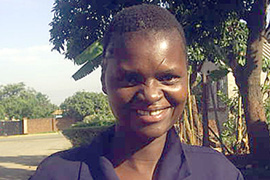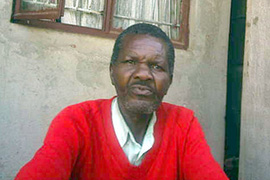UN who?
Many recipients of aid in Zimbabwe have never heard of the organisation providing it.

 |
| Unicef delivers water to residents of the Tafara township, 20km east of the capital Harare |
Mary Matangaidze sits in a queue with other villagers waiting to receive their monthly food allocation from the UN’s World Food Programme (WFP).
While a few of her neighbours momentarily leave the queue to seek shelter from the rain, she remains seated for fear of missing the day’s allocation. It is a risk she cannot afford to take considering that her seven children have had nothing to eat in two days.
Keep reading
list of 4 itemsAfter the Hurricane
World’s coral reefs face global bleaching crisis
Why is Germany maintaining economic ties with China?
When she finally spots a Nissan UD lorry making its way towards the crowd, she leaps to her feet and cries out to her peers: “Chikafu chemadonor chauya! (food from the donors has finally arrived).”
Mary is among millions of Zimbabweans who have been receiving food aid from UN-related organisations, its partners and other relief agencies.
Humanitarian crisis
 |
| Mary has never heard of the UN but appreciates the aid she gets from the WFP |
The country, which currently tops the list of southern African nations facing a humanitarian crisis, has not only been receiving food aid but also sanitation provisions, medication and farming equipment.
UN organisations have been working in Zimbabwe since its independence in 1980,
They have provided clean water, worked to alleviate poverty and offered free Aids/HIV testing and counselling, among many other assistance projects.
Recently, the level of assistance being offered, particularly in urban areas, has doubled as Unicef and the World Health Organisation (WHO) worked to improve clean water supplies following the country’s cholera outbreak.
However, many of the beneficiaries of this aid do not even know of the existence of the UN, let alone the services it renders to them and billions of others around the globe.
“We have been getting food from Wifipo [local slang for WFP], and the churches, but we are yet to get anything from that group [the UN] you talked about,” Mary tells me as she secures her food allocation in a wheelbarrow in preparation for her journey back home.
Many villagers like Mary are familiar with acronyms like WFP, Goal and Unicef, but do not understand the relationship between the UN and the people who help to put food on their table.
Neither the aid workers, who distribute the food hurriedly under the watchful eye of government intelligence and are often accused of meddling in local politics, nor local government have sought to correct this misnomer.
War-torn countries
 |
| Langton wonders why the UN has helped other African nations but not Zimbabwe |
Langton Maramba, who comes from the same drought-prone region as Mary, was quick to identify the UN as an organisation that intervenes in times of war.
The body had intervened to bring peace to war-torn countries like Somalia and the Democratic Republic of Congo, but it was yet to render any form of assistance to Zimbabweans, he said.
Tafadzwa Mumba, the UN information officer for Zimbabwe, says the reason so few are familiar with the organisation is the semi-autonomous nature of the various UN agencies working on the ground.
“People always appreciate those people who they are in touch with but what is important is that the various UN agencies work under the guidelines and mandate of the international body,” she told Al Jazeera.
“The UN is actually working on a pilot programme to find out how the UN family – with its many and diverse agencies – can deliver in a more coordinated way in the country.”
Since January, UN relief agencies like the WFP have fed more than 2 million Zimbabweans and with the regional meteorological department predicting low rainfall, impending drought may make their work even more vital.